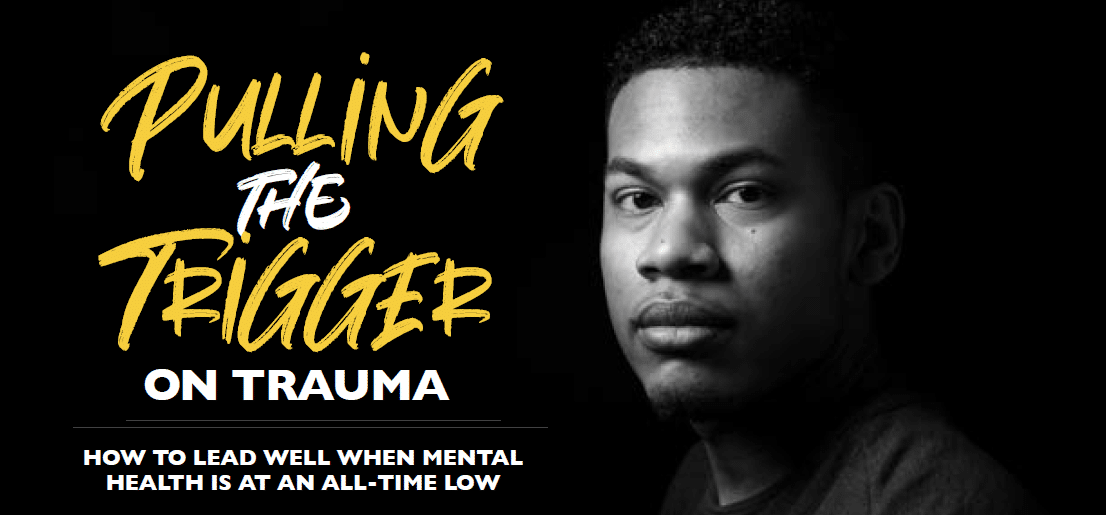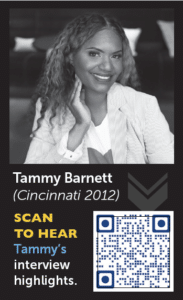Pulling the Trigger on Trauma
Posted by: DVULI | May 28, 2024

How to Lead Well When Mental Health is at an All-Time Low
By Ebonie Davis (Washington DC 2022), Contributor
HOW DO WE MEET THE DEEP LONGING OF THE SOUL?
Mental health for young people has reached an all-time low. Gen Z is labeled the loneliest generation, and early indications suggest that Gen Alpha, just starting to enter our teen ministries, isn’t faring much better. The problem is compounded for young people from urban communities. Suicide is the second leading cause of death for black boys aged 14 to 25 (after homicide). The community can’t survive with these statistics.
Urban youth workers can’t afford not to be intentional with strategies to lead well through this crisis. There’s always hope when God’s people are ready to mobilize. Recently, we sat down with four DVULI alumni and experts in the mental health field—Tammy Barnett (Cincinnati 2012), Bernard Franklin (Kansas City 2001), Nike Greene (Portland 2005), and Archie Honrado (Los Angeles 2010)—to give us some direction as we try to navigate our way forward.
Helping the youth we serve must begin by addressing the church’s complicity in contributing to stigmas that compound the reluctance to seek professional help, namely the tendency to over-spiritualize mental issues. Tammy was drawn to Christian therapy in part because she saw how the church often fell short of helping people by failing to offer tools beyond prayer. “What happens after you pray?” Tammy asserts. “So much of our population got lost, and we just wrote them off. ‘We are going to keep on praying.’ Absolutely, we can do that first, during, and after, but in the midst of it, we’re going to give the person some tools.”
Nike encourages churches to help by normalizing the conversation around mental health. We can do that by speaking openly from the top levels of ministry leadership, opening our ministries to therapists and recovery programs, and bringing in professionals to help. Recently, her church decided to make grief
materials and counselors available during funerals. Just as we encourage healing for any other illness, anything we do to encourage mental health care helps break the stigma. This requires us to get past the misconception that science is contrary to our faith—they work together. Brain science suggests that Christian practices like prayer and meditation provide neurological effects similar to those of some drugs, indicating that these practices may help reduce addiction. Science also helps us understand how the brain is impacted by trauma, so we can be better equipped to respond.
There are other hurdles stifling the work of mental wholeness in our communities, like the fallacy that our issues aren’t severe enough to warrant help. Nike points out that this mindset is rooted in racism. “There was this idea that black and brown bodies have the ability to endure more pain,” she explains. “We are to not show emotion. Any sign of the inability to carry ‘our weight’ or the weight of others is a sign of weakness.” Add to that the scarcity of black and brown representation in the field. Less than one percent are black males. Nike alerted us to the troubling reality that this often requires “explaining what you meant by what you just said” to therapists unfamiliar with the urban context, which can be re-traumatizing.
This underscores how important it is for urban youth leaders to recognize how their ministries are tackling this problem. Springtide’s 2022 State of Religion and Young People found that when young people had more significant connections, it correlated with decreased mental health issues. Urban ministries are uniquely poised to help young people in our communities develop these vital support systems. Archie suggests that youth workers see themselves as “diplomat anthropologists” who build bridges that promote intergenerational relationships and revisit youth group structures to facilitate these connections. Embracing Trauma-Informed Care can help make our ministries safe places. This is heavy lifting. Bernard explains, “We have to create conscious, deliberate spaces for people to
share their most vulnerable, ugliest, most horrific events in their lives. If we don’t, we do them more harm because people who have been hurt might think that if the person who is representing God gives them shame, God must also be shaming them. As an agent of God, I have to make sure I understand how we create safe spaces.” In Archie’s context, this looks like a listening circle where responding is only by invitation, and he encourages youth workers to cultivate the art of listening.
Our experts agree that if we are to lead well during this mental health crisis, then it is critical to start with our own mental wellness. Nike presses in on this point. “We as adults need to do our work. You can’t take a person to a place you’ve never been. And so, we have to do our
own therapy. We need to make sure we’re dealing with our own trauma. We need to model what it means to take care of ourselves.” This isn’t just something to think about when issues
arise but as a part of everyday self-care.
Bernard recommends a daily 15-minute Personal Wellness Checklist where he reflects on his physical, intellectual, emotional, and spiritual state. He highlights another benefit of our self-work: authenticity. “The more I work on myself, the more I show forgiveness, love, generosity, peace, and grace; however, the more I think this doesn’t apply to me, the more people will sense that I am not a safe space, and they cannot trust me.” Nike aptly summarized the value of our attention to this crisis. “We have a higher accountability to become the vessels that God has called us to be, and that includes addressing our own mental health and pursuing wellness. I want to be the adult I needed when I grew up.”
Who among us would not say the same?
*Some quotes have been edited for clarity and conciseness.





